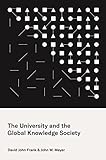The University and the Global Knowledge Society / David John Frank, John W. Meyer.
Material type: TextSeries: Princeton Studies in Cultural SociologyPublisher: Princeton, NJ : Princeton University Press, [2020]Copyright date: ©2020Description: 1 online resource (288 p.) : 9 b/w illus. 23 tablesContent type:
TextSeries: Princeton Studies in Cultural SociologyPublisher: Princeton, NJ : Princeton University Press, [2020]Copyright date: ©2020Description: 1 online resource (288 p.) : 9 b/w illus. 23 tablesContent type: - 9780691202051
- 9780691202075
- Education and globalization
- Education, Higher -- History
- Education, Higher -- Social aspects
- Educational sociology
- Knowledge, Sociology of
- Universities and colleges -- History
- Universities and colleges -- Social aspects
- EDUCATION / Higher
- Chronicle of Higher Education
- college
- contemporary university
- economic role of university
- education policy
- global university
- globalization of the university
- globalization
- higher education policy
- history of higher education
- information economy
- knowledge economy
- neo-institutionalism
- neo-institutionalist
- political role of university
- postwar university
- rise of the university
- social role of university
- sociology of education
- threats to the university
- understanding the university
- 378.009 23
- LC191.9 .F69 2020
- LC191.9 .F69 2021
- online - DeGruyter
- Issued also in print.
| Item type | Current library | Call number | URL | Status | Notes | Barcode | |
|---|---|---|---|---|---|---|---|
 eBook
eBook
|
Biblioteca "Angelicum" Pont. Univ. S.Tommaso d'Aquino Nuvola online | online - DeGruyter (Browse shelf(Opens below)) | Online access | Not for loan (Accesso limitato) | Accesso per gli utenti autorizzati / Access for authorized users | (dgr)9780691202075 |
Browsing Biblioteca "Angelicum" Pont. Univ. S.Tommaso d'Aquino shelves, Shelving location: Nuvola online Close shelf browser (Hides shelf browser)

|

|

|

|

|

|

|
||
| online - DeGruyter The Deportation Machine : America's Long History of Expelling Immigrants / | online - DeGruyter Inside the Mind of a Voter : A New Approach to Electoral Psychology / | online - DeGruyter A Passion for Ignorance : What We Choose Not to Know and Why / | online - DeGruyter The University and the Global Knowledge Society / | online - DeGruyter The Great Demographic Illusion : Majority, Minority, and the Expanding American Mainstream / | online - DeGruyter Democratic Federalism : The Economics, Politics, and Law of Federal Governance / | online - DeGruyter The War on the Uyghurs : China's Internal Campaign against a Muslim Minority / |
Frontmatter -- CONTENTS -- ACKNOWLEDGMENTS -- 1. The University as a World Institution -- 2. The Worldwide Instantiation of the University -- 3. The University Population in World Society and University Organizations -- 4. The Societal Culture of -- 5. The Human Actor and the Expansion of Academic Knowledge -- 6. The Expanded University and the Knowledge Society -- 7. Reflections on the Global Knowledge Society -- NOTES -- REFERENCES -- INDEX
restricted access online access with authorization star
http://purl.org/coar/access_right/c_16ec
How the university went global and became the heart of the information ageThe university is experiencing an unprecedented level of success today, as more universities in more countries educate more students in more fields. At the same time, the university has become central to a knowledge society based on the belief that everyone can, through higher education, access universal truths and apply them in the name of progress. This book traces the university's rise over the past hundred years to become the cultural linchpin of contemporary society, revealing how the so-called ivory tower has become profoundly interlinked with almost every area of human endeavor.David John Frank and John Meyer describe how, as the university expanded, student and faculty bodies became larger, more diverse, and more empowered to turn knowledge into action. Their contributions to society underscored the public importance of scholarship, and as the cultural authority of universities grew they increased the scope of their research and teaching interests. As a result, the university has become the bedrock of today's information-based society, an institution that is now implicated in the solution to every conceivable problem.But, as Frank and Meyer also show, the conditions that helped spur the university's recent ascendance are not immutable: eruptions of nationalism, authoritarianism, and illiberalism undercut the university's universalistic and rationalistic premises, and may threaten the centrality of the university itself.
Issued also in print.
Mode of access: Internet via World Wide Web.
In English.
Description based on online resource; title from PDF title page (publisher's Web site, viewed 26. Mai 2021)


